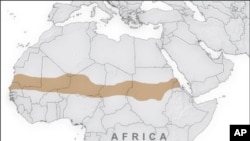The United Nations World Food Program on Wednesday hosted an emergency joint meeting of humanitarian agencies to address the growing food crisis in the Sahel region of West Africa. Millions of people are affected by drought in the area.
The Rome-based World Food Program (WFP) hosted the high-level meeting and warned that the international community must mobilize to help the Sahel quickly.
Josette Sheeran, WFP executive director said, “Today leaders of United Nations agencies, representatives of affected governments and major donors are calling for [an] urgent scale up of humanitarian, rehabilitation and development assistance to address rising levels of hunger and malnutrition caused by the combined effects of drought, high food prices, displacement and conflict affecting the Sahel region of West Africa.”
After a drought destroyed the majority of the harvest in the region last year, rural populations throughout the Sahel region started to run out of food early this month. The drought is severe and officials have been calling for urgent intervention to prevent a famine.
Thomas Yanga is WFP regional director for the West Africa region said, "At the peak of the lean season it is estimated that more than 10 million people will need assistance, and for WFP, we'll be targeting about eight million of those people who will require $800 million to provide that assistance.”
Plagued by the global financial crisis it has not been easy to get donors to respond to the urgent requests for funds, according to Kristina Georgieva, the EU commissioner for Humanitarian Aid and Crisis Response.
“We in the European Commission have taken decisions to substantially increase our assistance for the region," said Georgieva. We have more than doubled humanitarian assistance to 123.5 million. We are also beginning development funds for 150 million euros so we can tackle the immediate needs but also underpin long-term resilience.”
The Sahel is a vast, sprawling region, with many villages in remote and inaccessible areas, making it complicated to distribute food supplies. It suffers from drought cycles.
All representatives attending the meeting stressed it is necessary to act now and act together to meet the immediate needs of the population in the Sahel, and to work towards making it more resistant to crisis in the future.












